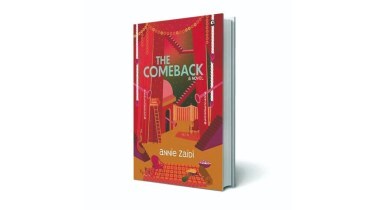How often is it that while reading a book or watching a movie or a show, you absolutely fall in love with a character who is not the conventional hero or heroine of the story?
If your answer is never, I’d suggest you pick up Annie Zaidi’s latest novel, The Comeback. With a premise that elicits nostalgia, crisp dialogues, and everyday characters that you relate with, the book makes for an interesting read.
The story revolves around actor John K (or Jaun Kazmi, who, as an estranged friend of his says, only goes by a screen name because he worries the original ‘would be less appealing to the masses’) who finally gets a break in mainstream cinema after years of doing small roles and gigs on sets. In a ‘fateful’ interview, he blurts out many stories, one of which costs his college best friend Asghar his job and puts his life in reverse gear. But accustomed to making difficult choices, Asghar attempts to take back control, albeit in an unconventional way.
The praise, though well deserved by the book, cannot be accorded to its protagonist. John (or Jaun) is an anti-hero of sorts, who does not really generate a feeling of sympathy in the reader, and as often as he does that, a feeling of indifference follows. You can’t blame him though, he’s as human as they get. To be fair, his arc is probably where Zaidi’s craft as a writer shines—you’re irritated by him, you don’t like the way he treats people, but you still hope that things work out for him. Because, who knows, he could be you and you could be him!
The short novel is also kept interesting by a barrage of side characters, who, to the writer’s credit, are developed well with fascinating arcs. Especially intriguing are The Comeback’s women. In domestic settings, nothing is easier than pitting women of different generations against each other. Zaidi doesn’t do that. Even when Asghar’s mother, Shakeela (or Sixty Percent Ma’am), is angry with her son, never does it translate to an ill word against ‘Dulhan’ Zubi, her daughter-in-law.
But for anyone who comes from a tier-2, -3 city or a village, what would hit close home is the depiction of Baansa, one of the main settings of the book, a village between Lucknow and Barabanki in Uttar Pradesh. At one point in the novel, Asghar says something that everyone who’s ever left their hometown or seen their favourite people move away would have thought, “People live in places like Baansa too, don’t they? People grow up here, study here, are buried here. It’s not like we’re starving or illiterate.”
The book grapples a lot with the worlds of theatre, cinema, and television; and through this, triggers contemplation on an interesting hierarchy that’s right in front of us but never paid heed to —that of the politics of where a play should be performed.
Zaidi, without stressing on the subject much, makes us question why we put a theatre production on a pedestal, but disregard a locally-produced play in small cities or villages as nautanki.
She doesn’t stop there. A bigger question follows: More often than not, it’s people from outside the big cities who bring nuance and certain contexts to enhance a play (or any form of entertainment, for that matter), it’s these people who build the stage and the props, and yet the productions never travel to their native places. Are the people who create art not deemed worthy enough to consume it? Why is it assumed that people in Baansa would not be able to grasp an adaptation of Dr Faustus, or that they’d need “physical aids” to compliment their understanding of the characters? Uff!
While the book is easy to read, the many layers it dives into are nuanced —be it John’s forever insecure, unhappy and unquestioning self, be it the lessons on “grow(ing) out of false expectations,” be it a mother compensating for her son’s silence, or be it about friends having your back but also knowing when to let go.
At its heart, The Comeback is about returning to the places and people you thought you outgrew, but those which remind you “access does not mean you belong”.
